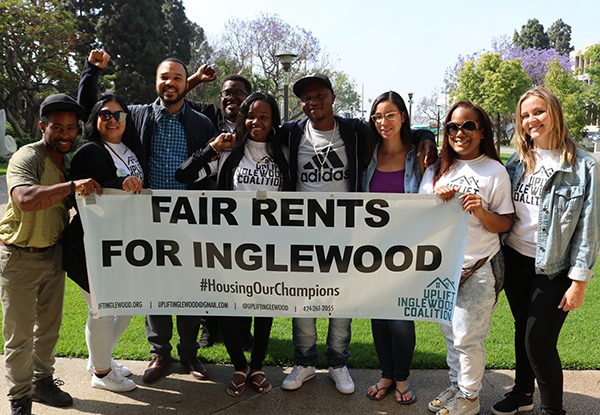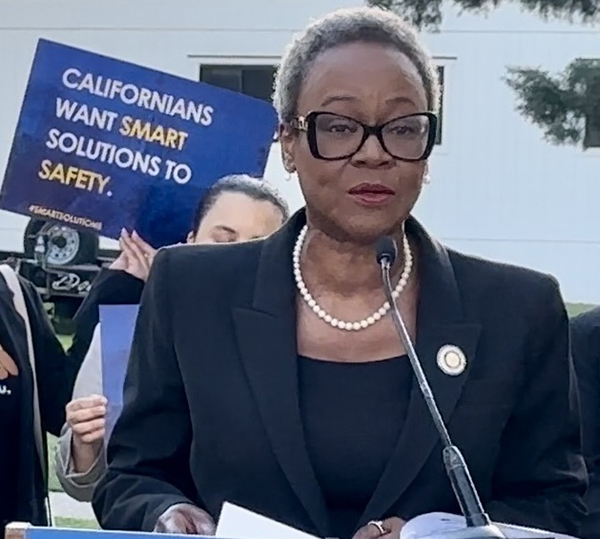By 2UrbanGirls
Contributing Writers
INGLEWOOD — The City Council has voted unanimously to amend the city’s housing protection ordinance during the regular City Council meeting April 27.
Housing Protection Department Deputy Director Yakema Decatur, presented the staff report and fielded questions from the council regarding the department’s proposed changes and how it would impact owners.
Decatur sought to establish a master fee schedule associated with operating the department, time frame to register rental units, enforcement of the ordinance, rental increases and just-cause evictions.
The ordinance was set to take effect Oct. 1, 2020, but was extended to Oct. 1, 2021, due to the COVID-19 pandemic
Mayor James Butts proposed delaying the collection of registration fees so long as owners register with the department during the modified deadline.
“For property owners that register their property, with the city’s Housing Protection Department, between Jan. 7, 2022, through March 31, 2022, fees will be waived until Oct. 1, 2022,” Butts said. “If you don’t register by March 31, 2022, you will be assessed fees beginning April 1, 2022.”
The limit of 3% plus the consumer price index for annual increases will remain intact. However, for the purposes of calculating the consumer price index, the city moved from the Los Angeles-Riverside-Orange County standard to Los Angeles-Long Beach-Anaheim standard for the 12-month period ending April 30 each year. The change was intended to more closely match the consumer price index with Inglewood’s location.
There are some exceptions.
Properties with five or more dwelling units will be allowed to increase their rent by 5% plus consumer price index, if rents are less than 80% of market value rent. Properties with four units or less, with rents less than 80% of market value rent, will be allowed to increase rent by 5%, plus the consumer price index, and an additional 2%. Both scenarios require approval from the Housing Protection Department.
“Are properties with five or more units and less than 80% of the median allowed an additional percentage in addition to the 5% the state gives?” Butts asked.
“They are not, but I wouldn’t be opposed to it,” Decatur said.
“I believe we’re below the median rents and I believe there should be an exemption so they are allowed to have the state increase, which is 5% plus the CPI plus and I’m going to make a motion to add that as an amendment,” Butts said.
Other significant changes include: raising registration fees to $206 for all units, without regard to the number of units on the property. Previously, registration fees were $84 a unit for less than four units, and $168 a unit for more than five units.
According to the staff report “services provided to tenants and landlords do not vary based on property size.”
Landlords will be allowed to “pass through” 50% of the registration fee costs to its tenants, if paid on time.
The city also is requiring landlord to pay the registration fees on time in order to pass through costs to the tenant. Should the owner not pay their registration fees on time, they will be prohibited from advertising the unit, either demanding or collecting rent from their tenant, until the registration fee is paid.
Another significant amendment is the removal of the sunset clause, which would have resulted in the automatic repeal of the ordinance on Dec. 31, 2024.
City staff recommended the sunset date be removed in order to avoid the potentially sudden removal of an important protection for tenants.
The department recommends the City Council revisit the rent increase amounts, within nine years, to coincide with state legislation, which ends in 2030.
Just cause eviction protections were modified to remove the option for landlords to evict a tenant who failed to sign a renewed lease. The department didn’t want tenants, wishing to convert their lease to month-to-month tenancy, giving up their rights and protections under the Inglewood Municipal Code.
The ordinance also addresses loopholes in the “just cause” grounds for eviction for a substantial remodel of the rental unit. Staff was concerned “substantial remodel” was not clearly defined and in turn created a high risk of becoming a loophole.
“The new owners offered only long-term residents the opportunity to take advantage of a monetary incentive to relocate so they could make renovations of their units,” said Shannon, who called in to the City Council meeting. “When I declined their offer, I was told on June 30 the eviction moratorium would end at which point I would be given an eviction notice, would have to vacate and with no relocation assistance. I am a good tenant, and pay my rent on time every month. How could I be evicted?
“The current ordinance lists substantial renovations for just-cause evictions, which in my opinion, is a loophole that new owners are taking advantage of and doesn’t protect tenants,” Shannon said. “I have lived in this unit for over 10 years. I don’t want to move.”
One owner called in to state the proposed changes don’t benefit the landlords’ bottom line of profitability.
“Please consider the long-term impact the proposal will have on both owners and tenants, where it disproportionately impacts small business owners that have provided rents significantly below market rate,” Bob McLaughin said. “The people at the bottom are being forced to renovate units to remain profitable.”
The council approved modifying the basis for just cause evictions, for renovations and will allow owners to pass through 50% of the renovation costs to the tenant, through a rent increase of no more than $100 per month, and imposed for no longer than 72 months (whichever comes first).
“The proposed ordinance combines substantial remodels with capital improvements, and instead of it being fees where they can recoup 50% of their costs, we’re making it rent and that way it protects the owners if the tenant chooses not to pay,” Decatur said.
Councilman Eloy Morales questioned the motivation in the initial department request of a $50 fee, as opposed to the last-minute request to turn the fee into an additional $100 of rent.
“Motivation is just what the first lady called about, she lived somewhere for 10 years, she doesn’t want to move and doesn’t want the relocation, but under the current iteration she would have to move even if she didn’t take the $10,000. This would give her the option to stay but she would have to share in the cost for the renovations,” Butts said.
Morales wanted it clarified, on record, what the motivation was behind Butts’ amendment and implored Decatur to go further.
“The caller that called is what I call a ‘lucky’ tenant because I’ve been getting calls from seniors where the new property management has been telling them when June 30 comes, you’re going to get a 60-day increase because we are going to do a substantial remodel but only offering $3,000 when I calculate relocation should be $12,000 so I tell my seniors don’t move,” Decatur said.
“Landlords are being forced out of business,” former state Sen. Rod Wright said. “Eventually, we will be forced to sell to the ‘big boys’ because we can’t afford to keep up the property.”
All proposed amendments were unanimously approved by the City Council.
2 Urban Girls is a freelance reporter for Wave Newspapers who covers the Compton and Inglewood areas. She can be reached at 2urbangirls@gmail.com.












